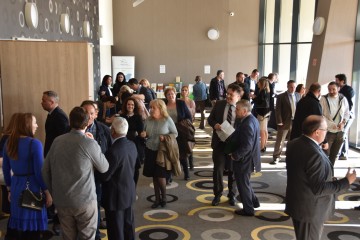The project addresses the problems detected within the implementation of EDOTOP 1 and ECOTOP2 projects: Improving tourism offer in the region in order to make the region more attractive to tourists interested in different forms of ecotourism and educational programs in marketing for service providers. In the previous projects, the conducted research and studies indicated that ecotourism offer in the region exists, but it is not sufficiently developed and one of important development drivers is service provider education. The purpose of this project is to develop comprehensive educational support for food-tourism providers facilitating demand on emerging special dietary restrictions consumer market. This support will provide education and training for adjustment of food touristic offers in cross-border counties to the current food consumer demands and trends in the tourism sector and thus positively affect the situation in self-employment of young population and employment in the tourist sector in general.
The overall objective of the project is to improve the availability of training in the field of special dietary restrictions consumer market through development and implementation of training programs, creative student camp – workshop, panel discussion for students, entrepreneurs and academia, student workshop for innovation in the food production segment, idea competition for compilation of touristic product packages targeted at special dietary demands, workshop based on topic of different dietary approaches/trends, training on how to prepare "free" dishes. The project will generate training program for students and food tourism service providers, study of inclusion of the Roma and mentally or physically ill population, refugee and other possible minorities in the food tourism system and handbook for educational support of food-service providers facilitating demand on emerging special dietary restrictions consumer market. It also involves exchange programs, business idea competition and student creative camp. The partnership is structured in a way that it involves institutions from all relevant segments: higher education and business support institutions (chambers), since it is necessary for quality development of activities.
Project Database
Comprehensive educational support of food-service providers facilitating demand on emerging special dietary restrictions consumer market
HUHR/1901/4.1.1/0058
GASTROTOP
Visoko gospodarsko učilište u Križevcima
Magyar Agrár és Élettudományi Egyetem
Somogyi Kereskedelmi és Iparkamara
Veleučilište u Virovitici
Zala Megyei Kereskedelmi és Iparkamara
HUHR/1901
Co-operation in higher education
€ 291,243.20
€ 247,556.72
85.00 %
01 June 2021 − 30 September 2022
Zala megye, Somogy megye, Koprivničko-križevačka županija, Virovitičko-podravska županija
Finalized
